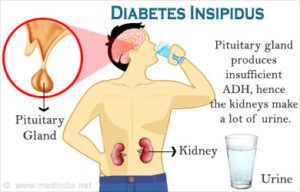[su_divider top=”no” style=”double” divider_color=”#952524″ link_color=”#952524″ size=”2″ margin=”10″]
What is Diabetes Insipidus? How to manage it? What are the precautions to be taken? What are the signs and symptoms? What is the cause of this disease? How to treat it? How can homeopathy help you? All of this answered, in this post and of course our doctors always there to help you. Just fill in your details in the form down below and we will answer all your questions for FREE!
[su_divider top=”no” style=”double” divider_color=”#952524″ link_color=”#952524″ size=”2″ margin=”10″]
[sc name=”query”]

What is Diabetes Insipidus?
Diabetes Insipidus is a condition characterized by excessive thirst and excretion of large amounts of severely diluted urine, with reduction of fluid intake having no effect on the concentration of urine. It is a condition in which the kidneys are unable to conserve water.
Mainly this disease is caused by a deficiency of ADH (Anti-Diuretic Hormone) also known as vasopressin which is produced by the hypothalamus. ADH acts by increasing water permeability in collecting ducts and distal convoluted tubules.
Who is more prone to get affected with Diabetes Insipidus?
Most of the heredity nephrogenic DI is an X- linked disorder mostly occurs in males.
No age-related differences in central or nephrogenic DI exist.
What is the classification of Diabetes Insipidus?
The several forms of Diabetes Insipidus (DI) are:
• Neurogenic: Neurogenic diabetes insipidus more commonly known as central diabetes insipidus, is due to lack of vasopressin production in the brain.
• Nephrogenic: This happens due to the inability of the kidneys to respond normally to vasopressin.
• Dipsogenic: Dipsogenic DI is due to defect in or damage to the thirst mechanism, which is located in the hypothalamus.
• Gestational: It occurs only during pregnancy. It is thought to occur with excessive vasopressin production which is produced in the placenta.
What are the causes of Diabetes Insipidus?
The following are considered to be the cause of Central DI:
• Idiopathic
• Malignant or benign tumor of the brain or pituitary
• Cranial surgery
• Head trauma
• Hypoxic encephalopathy
Following are the causes of Nephrogenic DI:
• Lithium toxicity
• Hypercalcemia
• Hyperkalemia
• Renal disease
• Pregnancy
What are the signs and symptoms of Diabetes Insipidus?
• Polyuria
• Polydipsia
• Nocturia
When infants get affected with DI:-
• Crying
• irritability
• Growth retardation
• Hyperthermia
• Weight Loss
In children, the following manifestations typically predominate:
• Enuresis
• Anorexia
• Fatigability
When the underlying condition which caused Diabetes insipidus damages anterior pituitary the following presentation of symptoms are presented: –
• Excessive fatigue
• Diminished Libido
• A headache
• Dry skin
• Hair loss
What investigations are advised in cases of Diabetes Insipidus?
• MRI of the head
• Urinary specific gravity
• Urine output
What treatment is advised for Diabetes Insipidus?
Drug therapy: Desmopressin and other drugs like carbamazepine, clofibrate, thiazides, and NSAIDs.
What are the dietary changes advised in cases of Diabetes Insipidus?
Monitoring the patient regularly.
Fluid replacement: Drink enough fluid to replace their urine losses.
What is the prognosis of Diabetes Insipidus?
The prognosis is excellent, depending on the underlying illness. In cases of nephrogenic Diabetes Insipidus which is caused by medication (eg, lithium), discontinuing the medication may help to restore normal renal functions.
What is the differential diagnosis of Diabetes Insipidus?
• Diabetes mellitus
• Hypercalcemia
• Hypokalemia
• Head trauma
• Sickle cell anemia
What are the complications of Diabetes Insipidus?
Not drinking enough fluids can lead to:
• Dehydration
• Electrolyte imbalance
What Homeopathic remedies are advised for the management of Diabetes Insipidus?
Apis
Phosphoric acid
Uranium nitrate
For more information, you can visit NIDDK and MayoClinic.
Diabetes Insipidus
[su_divider divider_color=”#952524″ link_color=”#952524″ size=”2″ margin=”10″]
[sc name=”know-your-doctor”]
[sc name=”more-links-diseases”]

